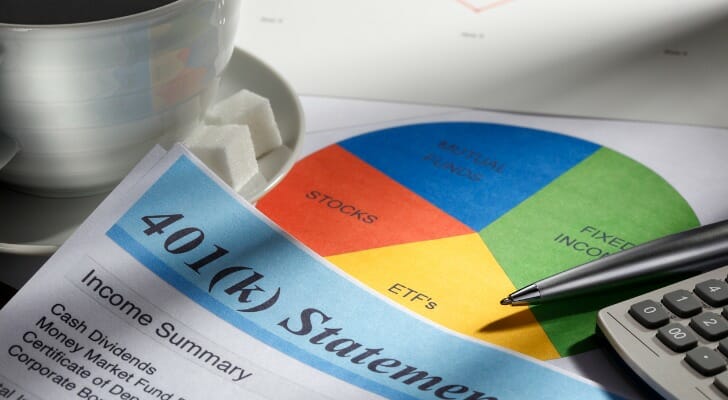Most retirees have multiple income streams, including 401(k)s, traditional or Roth IRAs, Social Security, pensions, annuities, among others. However, 401(k)s and Social Security are two of the most prevalent retirement income tools, so understanding the differences between them can be hugely beneficial. In turn, it shouldn’t come as a surprise that accounting for both of these income sources in your retirement plan is a good goal to pursue.
Do you have questions about building a long-term retirement plan? Speak with a financial advisor.
How Do Social Security and 401(k)s Differ?
When you’re talking about Social Security and 401(k) plans you’re talking about two things that fulfill a similar purpose in different ways. Social Security is a federal program that provides financial benefits to eligible people. That includes disability benefits for people who are unable to work as well as retirement benefits for people who have chosen to stop working.
The Social Security program is funded through payroll tax deductions. So if you work for an employer or are self-employed, you’ll pay Social Security tax on your earnings. This money goes into a trust fund, which pays out benefits to retirees every month. The amount of money you can receive from Social Security retirement benefits depends largely on your earnings and marital status. The earliest you can receive Social Security retirement benefits is age 62.
A 401(k) is a defined-contribution plan. These plans can be offered by employers to employees who fund them through voluntary salary deferrals. In simple terms, you can fund a 401(k) through paycheck deductions. Your employer can choose to match your contributions, though not all companies do this.
The money in your 401(k) can be invested in mutual funds, target-date funds or other securities. Your options typically depend on what the plan administrator chooses. Your 401(k) contributions grow tax-deferred and your contributions are tax-deductible. You can make qualified withdrawals from your account with no tax penalty beginning at age 59 ½. But you’ll owe income tax on the money you withdraw.
Do You Still Get Social Security If You Have a 401(k)?
Having a 401(k) plan at work doesn’t prevent you from drawing Social Security retirement benefits. The two are completely separate from one another, so whatever you get from Social Security isn’t affected by any money you’re withdrawing from a 401(k).
Receiving Social Security benefits and taking withdrawals from a 401(k) in retirement can affect your tax bracket, however. Remember, with traditional 401(k) plans, withdrawals are subject to income tax. So the more you withdraw each year to supplement any benefits you’re receiving from Social Security or other sources, the more you could owe in taxes.
Talking to a Social Security benefits specialist or your financial advisor can help you decide how much to withdraw from your 401(k), based on your retirement budget and what you’re getting from Social Security.
Should I Use a 401(k) Before Social Security?

The minimum age you can start taking Social Security retirement benefits is 62. Meanwhile, you can begin taking withdrawals from your 401(k) without a tax penalty at age 59 ½. The rule of 55 could technically allow you to take penalty-free withdrawals from a 401(k) as early as age 55 when certain conditions are met.
So, whether you should use your 401(k) before Social Security may be a moot point in terms of when you can tap into each one. There is a good reason, however, to consider relying on 401(k) withdrawals for as long as possible before taking Social Security retirement benefits. Delaying benefits longer can result in a higher benefit amount.
For example, if you can wait until age 70 to take Social Security, you can receive a benefit that’s equal to 124% of your normal retirement age benefit, if that age for you is 67. If your normal retirement age was 66, then your benefits would be 132% of your original amount.
That’s a nice incentive to draw on your 401(k) first. If you were to take Social Security at age 62, on the other hand, your benefit amount would be reduced since you haven’t yet reached full retirement age as defined by the Social Security Administration (SSA).
Do 401(k) Contributions Reduce Social Security Benefits?
Again, it’s important to remember that your 401(k) plan is an entirely separate thing from Social Security. Your 401(k) is offered by your employer, while Social Security comes from the government. So, making contributions to a 401(k) will not reduce your Social Security benefits in any way.
And it’s a good idea to contribute to your 401(k) for retirement, even if you’re counting on taking Social Security benefits. For one thing, you’re getting some key tax benefits since your contributions qualify for an above-the-line tax deduction and growth is tax-deferred. For another, you can pick up some free money for retirement if your employer matches contributions.
Besides that, it’s important to remember that Social Security benefits alone may not be sufficient to meet your income needs in retirement. Making contributions to your 401(k) now could provide you with a vital source of income several decades from now when you’re ready to retire.
How to Make the Most of Social Security vs. 401(k)
Social Security and 401(k) plans represent two fundamental pillars of retirement planning, each serving different purposes in your financial future. Social Security provides a guaranteed income stream based on your lifetime earnings and work history, while a 401(k) is an employer-sponsored retirement savings account that you control and fund throughout your working years. Maximizing Social Security benefits revolves largely around deciding when to take benefits. You have three options:
- Take Social Security early
- Wait until you reach full retirement age
- Delay benefits up to age 70
Waiting longer to take benefits could result in a larger benefit amount. But whether that’s realistic can depend on how much you have in a 401(k), individual retirement account (IRA) or other savings accounts. So you may choose to take benefits at your normal retirement age instead.
With a 401(k) plan, maximizing your savings starts with saving as much as you can or at the very least, saving enough to get the full company matching contribution. You can also make the most of your plan by choosing low-cost investments so you’re paying less in fees.
Most importantly, remember that time is on your side with a 401(k). The longer you have to save, the more time you have to take advantage of the power of compounding interest. So if you’re just starting your career, for example, don’t pass up the opportunity to enroll in your employer’s plan. You can start small with contributions, then increase them incrementally year over year as your income grows.
How to Prepare for Retirement With Both a 401(k) and Social Security
Planning for retirement requires a strategic approach that combines employer-sponsored plans with government benefits. When you prepare for retirement with both a 401(k) and Social Security, you create a more robust financial foundation for your later years. These complementary income sources work together to help maintain your lifestyle after you stop working.
Social Security provides a baseline of retirement income that adjusts with inflation. Your benefit amount depends on your earnings history and the age at which you begin collecting. Delaying benefits past your full retirement age (typically 66-67 for current workers) can increase your monthly payment by up to 8% per year until age 70, providing a guaranteed income boost.
Aim to contribute at least enough to your 401(k) to capture your employer’s full match. After securing this “free money,” consider your overall retirement needs and timeline. Financial advisors often recommend saving 15-20% of your income for retirement, adjusting based on your age and retirement goals.
Finally, developing a thoughtful withdrawal plan can help optimize both tax efficiency and benefit amounts. Your 401(k) offers flexibility in timing withdrawals (though penalties may apply before age 59½), while Social Security follows a fixed schedule based on when you claim benefits. A financial advisor can help determine the optimal claiming strategy for your situation.
Bottom Line
 Knowing the differences between Social Security vs. 401(k) plans is important for creating a well-rounded retirement plan. One doesn’t require you to do anything other than work and pay Social Security taxes while the other requires you to be a bit more hands-on in mapping out your retirement future. But both can play a central role in helping you to shape your retirement dreams.
Knowing the differences between Social Security vs. 401(k) plans is important for creating a well-rounded retirement plan. One doesn’t require you to do anything other than work and pay Social Security taxes while the other requires you to be a bit more hands-on in mapping out your retirement future. But both can play a central role in helping you to shape your retirement dreams.
Retirement Planning Tips
- A financial advisor can help you build a financial plan to get you to retirement. Finding a financial advisor doesn’t have to be hard. SmartAsset’s free tool matches you with vetted financial advisors who serve your area, and you can have a free introductory call with your advisor matches to decide which one you feel is right for you. If you’re ready to find an advisor who can help you achieve your financial goals, get started now.
- If you use a 401(k) or other workplace retirement plan, make sure you take advantage of any employer match. This is essentially a 100% return on the money you invest in your 401(k), so at least contributing up to the employer match amount can be beneficial over the long term.
Photo credit: ©iStock.com/YinYang, ©iStock.com/DNY59, ©iStock.com/Thurtell
